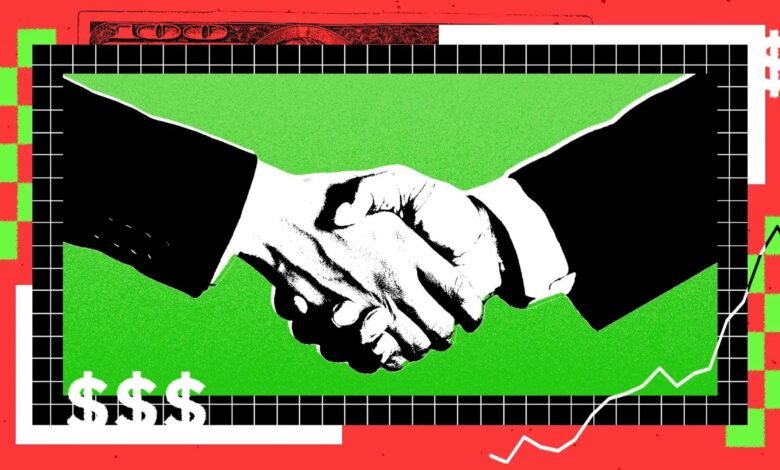Big Deals Are Back With a $53 Billion Bang

This article originally appeared on Business Insider.
Corporate dealmaking is staging an epic comeback this year.
This week alone, Capital One agreed to acquire Discover for $35 billion, Truist Financial announced a $15.5 billion sale of its insurance arm, and Walmart shook hands to buy TV maker Vizio for $2.3 billion.
The trio of transactions, worth a combined $53 billion, have lifted the value of deals announced worldwide this year to $425 billion — a 55% increase from the same period in 2023, Bloomberg estimates.
That’s a stark contrast from the past two years. Global deal values tumbled from more than $5 trillion in 2021 to less than $3 trillion in 2023, and volumes slid 17% to 55,000 deals, per the London Stock Exchange Group.
Megadeals were hit especially hard. Transactions worth more than $5 billion plunged 60%, from nearly 150 deals in 2021 to fewer than 60 last year, LSE Group found.
Mergers and acquisitions, initial public offerings (IPOs), and other types of deals slumped in 2022 and 2023 because central banks’ inflation-fighting increases to interest rates made financing more costly.
A muted first half for stocks, recession fears, increased regulatory scrutiny, concerns of a US debt default, and the breakout of a second war also fueled uncertainty and flattened valuations.
Lofty valuations
This year’s deal bonanza reflects a sunnier market and economic outlook. Stocks are trading near-record highs, giving companies a powerful currency for dealmaking.
Lofty valuations also encourage selling, and many buyers like to bet on assets that are climbing in price in the hope of capturing future gains.
Meanwhile, the Federal Reserve and other central banks have signaled rates have probably peaked and are likely to drop this year, lowering borrowing costs and reducing the risk of recession.
Many companies are in good shape with strong cash flows and balance sheets, meaning they can afford to make acquisitions. There’s also pent-demand for deals after a couple of lean years, particularly among businesses that are eager to go public or are running short of money, seeking to expand, or looking to cut costs.
Moreover, private equity firms are under pressure to cash out the increased value of their assets and deliver a return to their backers.
Still, it’s far from a cloudless sky for aspiring dealmakers. Potential headwinds include stubborn inflation, a surprise recession, escalating armed conflicts, regulatory crackdowns, and uncertainty over this year’s presidential election.



